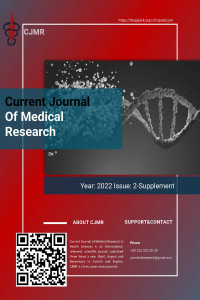Abstract
Epilepsi hastalığı, merkezi sinir sistemi harabiyetinden fiziksel ve fonksiyonel dejenerasyonlar ve bilişsel, psikolojik ve sosyal sorunlarla ile seyreden dejeneratif bir hastalıktır. T2DM (Tip 2 Diabetes Mellitus) ile ilişkili hiperglisemi, hiperinsülinemi ve hiperkolesterolemi gibi metabolik bozuklukların epilepsi hastalarında da gözlenmesi bu hastalıkların ilişkili olabileceğini düşündürmektedir. Çalışma grubumuz ise epilepsi hastalığına sahip, diyabeti olan ve olmayan hastaların; yaş, cinsiyet vb. tüm demografik özellikleri ile beraber epilepsi kliniğine ait bilgiler anlamında da nöbet sıklığı, nöbet süresi, nöbet tipi, nöbet şiddeti ve EEG bulguları araştırma dahilinde incelendi. SPSS programında Q-Q grafikleri, Mann-Whitney U testi, bağımsız örneklem T testi kullanılarak istatistiksel değerlendirme yapılmıştır. Ocak 2016 – Aralık 2021 tarihleri arasında İzmir Katip Çelebi Üniversitesi Atatürk Eğitim ve Araştırma Hastanesi Nöroloji kliniğimize başvuran, epilepsi tedavisi gören 18 yaş üstü hastalar ele alındı. Diyabeti var olan ve olmayan hastalar karşılaştırıldı. Diyabeti var olan hastalarda nöbet tipleri açısından diyabet varlığının nöbet tipi üzerine herhangi bir etkisi gözlenmedi. EEG açısından ise iki grup arasında anlamlı bir farklılık gözlenmedi. Diyabet görülen hastalarda, glikoz ve trigliserit değerlerinin daha yüksek olduğu görülmüştür. HemA1C değeri de anlamlı olmasa da yüksek olarak gözlendi. Bu veriler literatür ile uyumlu olarak tespit edildi. Epileptik ilaç kullanımı açısından her iki grup arasında anlamlı bir farklılık görülmedi.
Nöbet sıklığı açısından sık olan grupta glikoz değerleri, nöbetsiz olan gruba göre daha düşük olarak bulundu. Bu verinin glikozun epileptik süreçteki etkisi açısından ayrıca yorumlanması gerekmektedir. Sık nöbet geçiren grupta epileptik ilaç kullanımı da diğer gruplara göre yüksek olarak görüldü. Bu veri de klinik pratik ile uyumlu bir bulgu olarak değerlendirilebilir.
Çalışmada değerlendirilen hasta popülasyonunun oldukça küçük olması ve retrospektif bir şekilde elde edilen veriler üzerinden bu karşılaştırmaların yapılması, istatistiksel açıdan anlamlı farklılıkların ortaya çıkmamasına sebebiyet verebilecek olması nedeniyle çalışmamızın kısıtlılıkları olarak ifade edilebilir. Sonuç olarak bu konuda daha büyük popülasyonlarda, prospektif şekilde anti-diyabetik ilaç kullanımını da kapsayan ayrıntılı çalışmaların yapılmasının gerekliliği görülmektedir.
Keywords
Abstract
Epilepsy disease is a degenerative disease that is accompanied by physical and functional degeneration and cognitive, psychological and social problems from the destruction of the central nervous system. The observation of metabolic disorders such as hyperglycemia, hyperinsulinemia and hypercholesterolemia associated with T2DM (Type 2 Diabetes Mellitus) in epilepsy patients also suggests that these diseases may be related. Our study group included the age, gender, etc. of patients with and without diabetes mellitus with epilepsy. all the information in terms of demographic characteristics of the clinic epilepsy with seizure frequency, seizure duration, seizure type, seizure severity and EEG findings were examined within the scope of the study. Statistical evaluation was made by using Q-Q graphics, Mann-Whitney U test, independent sample T test in SPSS program. In January 2016 – December 2021, patients over the age of 18 who were treated for epilepsy and were admitted to our Neurology clinic of Izmir Katip Celebi University Ataturk Training and Research Hospital were examined. Patients with and without diabetes mellitus were compared. In terms of seizure types, no effect of diabetes presence on seizure type was observed in patients with diabetes mellitus. In terms of EEG, no significant differences were observed between the two groups. It has been observed that glucose and triglyceride values are higher in patients with diabetes mellitus. The HemA1C value was also observed to be high, although not significant. These data were determined in accordance with the literature. There was no significant difference between the two groups in terms of epileptic drug use.
Glucose values were found to be lower in the group with frequent seizure frequency than in the group without seizures. This data should be interpreted separately in terms of the effect of glucose on the epileptic process. The use of epileptic drugs in the group with frequent seizures was also observed to be higher compared to other groups. This data can also be considered as a finding compatible with clinical practice.
The patient population is quite small and a retrospective study evaluated the data obtained through this comparison did not show statistically significant differences in a manner that may give rise to the limitations of our study because it can be expressed as. As a result, it is necessary to conduct detailed studies on this issue in larger populations, including the prospective use of anti-diabetic drugs.
Keywords
Details
| Primary Language | Turkish |
|---|---|
| Subjects | Clinical Sciences |
| Journal Section | Conference Paper |
| Authors | |
| Publication Date | December 6, 2022 |
| Submission Date | June 13, 2022 |
| Published in Issue | Year 2022 Volume: 2 Issue: 2-Supplement |


